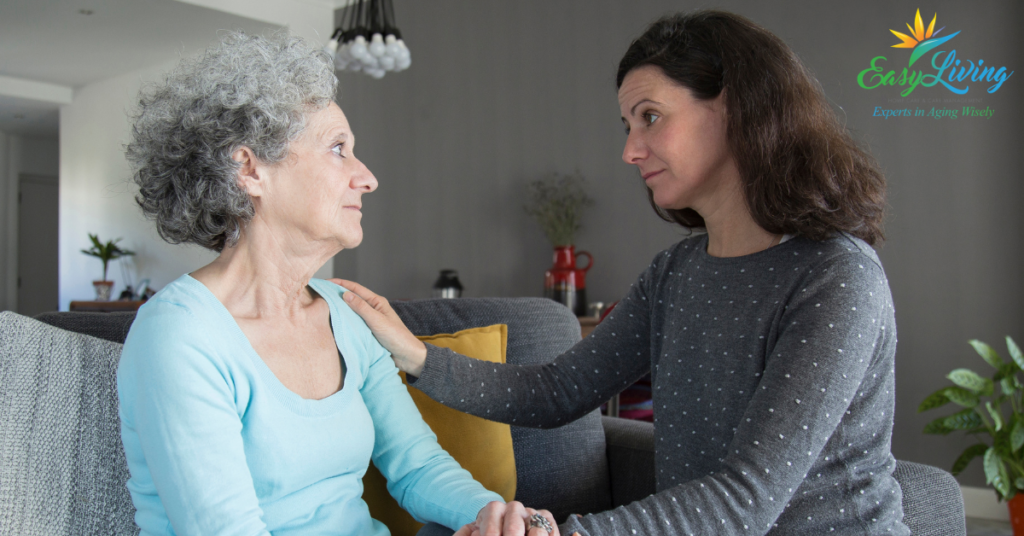For example, this feeling is quite common when caring for elderly parents. We wonder if we’re visiting enough or if there’s more we should be doing to “protect” them. In almost every case we’ve ever encountered, families are truly committed to each other. And, if anything, caregivers usually need to give themselves a break. We’ll share a few thoughts below about the many examples of how you’re likely a great daughter (or son). We want to remind everyone, especially this holiday season, about the little ways you give that you might not acknowledge.
This is especially important during this pandemic, when people are experiencing increased anxiety and depression. Additionally, you may be dealing with numerous changes all at once. And, you may be particularly worried about older loved ones. A lot of us are physically separated from them or restricted from participating in their lives the way we used to do.
These examples prove you’re a great daughter (or son)…
- You call your Mom to check in on her.
- You call her just to say hi. Or, you call to ask her for advice.
- You tell your parents you love them.
- You cook meals, grocery shop for them, or send them meals.
- You respect your parents’ wishes or statements that they don’t need help.
- You’re there if they do.
- You listen.
- You share happy memories with them.
- You send Mom a text or note to let her know you’re thinking about her.
- You teach your kids Mom’s best recipe.
- You share stories about your parents with your kids.
- You investigate resources that might help…even if they’re not ready for them yet.
- You read a lot of articles about aging and senior health or study up on Mom’s health issue.
- Your parents talk about you proudly to their friends.
- Mom calls you for input. Or, calls you just to talk.
- Dad asks you to help him figure out his Medicare plan.
- They love coming out to see your kids’ games or performances, or just hearing about how they’re doing.
- They ask you how you’re doing, they still worry about you too.
- They tell you stories and share bits of wisdom.
- They send you notes or clip articles they think will interest you.
This list could go on and on. It is not the same in all families. Parents show their love in different ways, as do their children. Your dynamics might be different. You can be a great daughter and do none of these things. And, sometimes you’ll do them while at other times you won’t be able to.
How self-care and boundaries make you a great daughter
We don’t want the list above to add to your guilt. Our idea is to show you that you do many little things that you might not even think about twice. And, they mean a lot. You don’t have to do it all. As a matter of fact, you shouldn’t try to. The best caregivers know how to “outsource”. In other words, they focus on what’s most important…especially time and attention for their loved ones. Meanwhile, they don’t try to handle every task themselves or they would never be able to provide that time and attention. When you try to do it all, you usually end up neglecting something.
And, there are some things someone else can just do better. Perhaps Mom needs help bathing, but doesn’t love the idea of her daughter doing that. Or, physically it is too hard on you and you might hurt yourself. When your Dad needs help with Medicare or his VA benefits, you can do all the research yourself. Or, you can be more efficient and call in an expert.
So, the reality is that getting help makes you a better caregiver. Doing it all yourself doesn’t mean you’re a better daughter or son. However, we completely understand that others may say things that make you feel differently. The others criticizing you may even be your parents. This is why we wanted to remind you of all the ways you are a great daughter/son. We hope you can take a step back from the guilt this holiday season…and beyond.
Here are our tips on how to continue being the best daughter while taking care of yourself and the others in your life:
- Remind yourself of those things you do, rather than focusing on what you’re not or can’t do. Read through our list above when you need a reminder. Or, make your own list.
- Set boundaries. Check out our article on negative parents for more on this. It all starts with forming an agreement, then setting certain boundaries, and sticking to them. It may help to have an accountability partner. This can be a friend, spouse, someone in a caregiver support group, or a care manager.
- Get support. We mentioned the accountability partner above. Online support groups help too. And, this also includes practical support with tasks. But, first you need to ask for help. If you find that hard to do, your accountability partner can help. Set up a consult with a care manager if you struggle with this. You might not even know what help is available, so this is a great place to start.
- Schedule in time for yourself. Don’t think of “me time” or “self-care” as an afterthought. Your parents need you to be healthy for them. And, even if your health isn’t affected by the stress, your attitude often is. Taking some time for yourself better equips you to give in your relationships.








